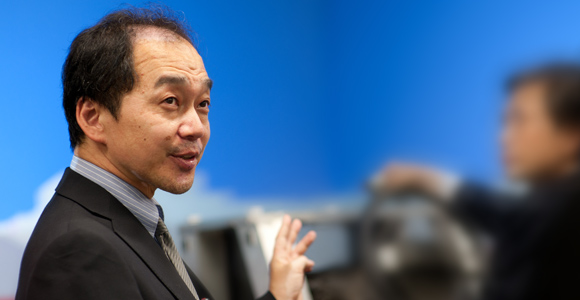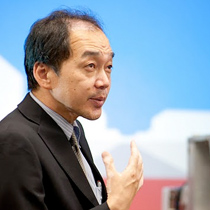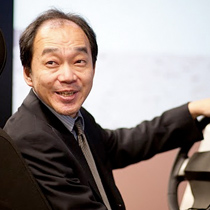Tetsuro OGI

SDM is where talented and versatile people who can think of things from various viewpoints are trained.
Tetsuro OGI , Ph.D.
Professor, Graduate School of SDM, Keio University
Research to develop user-friendly systems
Prof. Tetsuro Ogi's research began with research on human interfaces to provide user-friendly information systems and media systems, including computers. His recent major research topics include virtual reality (VR) technology with 3D video or five-sense information, augmented reality (AR) technology, and tele-immersion technology (interface through networks.) These research projects require a wide range of knowledge, not only of computers but also of human psychology and physiology, and their areas of application. His research is multi-faceted, including human and other areas of application as well as the technological development of information systems. The fields of application continue to broaden since systems without information systems are unthinkable these days.
Simulator for safe driving

Together with an insurance company, Prof. Tetsuro Ogi and Prof. Hidekazu Nishimura are involved in joint research to train aged drivers to drive safely using a driving simulator that features highly realistic driving conditions. They also analyze the characteristics of simulated driving by aged drivers. Prof. Ogi generates interactive videos that are based on vehicle control technology simulations created by Prof. Nishimura. Unlike conventional research in the Faculty of Science and Technology, the goal of their research is not the development of technology but the gain of public acceptance of social issues. This is a typical approach to research at SDM.
Practical and realistic research
As Moore's Law suggests, the development of technology for information systems and media systems is rapid. A delay in implementation often allows a competitor to enter the market, thus dramatically decreasing the value of the research. A lot of research is conducted without consideration of practical use. In SDM, researchers are encouraged to keep an eye on the requirements of society, to envision implementation in the real world, and to create opportunities to engage in developing state-of-the-art technologies. Therefore it is important to acquire various skills and perspectives outside of their research fields. SDM offers an ideal environment for joint research and cooperation between researchers and laboratories. Prof. Ogi believes such an environment is one of SDM's most appealing points.
"To see the details as well as the big picture"

One of the educational principles at SDM is "to see the details as well as the big picture," which is not easy to follow. We need to work alone to study and experiment "to see the details," and we need to broaden our outlook by discussing our ideas with others "to see the big picture." These two approaches require a different attitude and behavior toward research. Group exercises teach a student to see the big picture at SDM, but continual practice at the individual level is the only way to learn to see the details. It is especially difficult to contemplate complicated issues once you start to see things in a broader context. Prof. Ogi believes it is important to go beyond the contemplation stage. The student must take action; make something or investigate something. Taking action enables you to find problems quickly instead of looking for the answers in books. Prof. Ogi encourages SDM students to think and then to take action immediately afterward.
Ideal environment for research and education
Research and education methodology should be universal, and though it shouldn't matter which organization you belong to, the reality is that it does matter. Many people gradually lose their broad perspective when they join a company that operates in a highly structured environment. Since SDM focuses on designing systems, and has a diverse body of students and professors from various academic disciplines working closely together, SDM provides the opportunity for real research and education.

